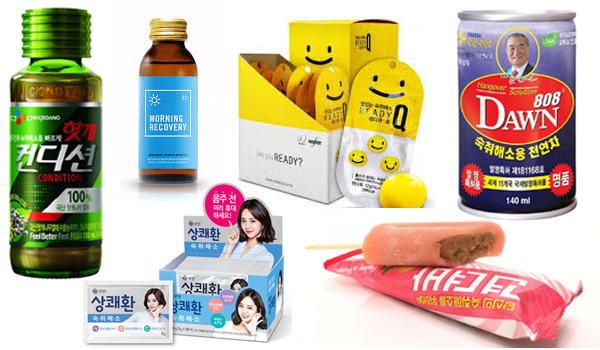Alcohol is a crucial part of daily life for Koreans drinking more hard liquor than most other people in the world, according to the research firm Euromonitor.
The Journal of Korean Medical Science also reports that every night about 6 million South Koreans drink 8.97 million bottles of soju, cheap distilled liquor called Korean vodka.
Korea is home to more alcoholics than many other countries with alcohol-related social costs amount to more than 23 trillion won ($19 billion) a year, a report of Korea Alcohol and Liquor Industry Association and Ministry for Health and Welfare shows.
With long working hours and companies hosting “hoesik”- dinner with co-workers- at least once a month or sometimes every week, Koreans can boast to have one of the heaviest drinking habits in the world, which in turn exerts lots of influence on its corporate culture.
The drinking etiquette, which requires that a person’s cup should never be left empty and refusing drinking is seen as rejecting generosity, increases the pressure to drink.
Because of alcohol binging nights, hangovers in Korea are the most common excuse for salaried people. To work the next day, however, many resorts to seeking help from anti-hangover beverages.
“I drink a bottle of soju every night to release my stress from work,” a drinker in his mid-30s said, who wishes to remain anonymous. “Out of habit, I buy a hangover drink in the morning before I go to work. I think they work because it relieves my hangover quicker and I feel more functional after.”
Many hangover-relief drinks contain extracts of oriental raisin tree known as a hutgae tree in Korean. They include properties that are believed to treat constipation, liver diseases, infections, fever, and hangovers.
According to Joongang Daily, the hangover-cure industry grossed more than 200 billion won ($165 million) in 2014, ranging from pills, beverages, gums, to even ice-creams to cover up the effects of a long night of drinking.
The most widely known hangover drink is called “Dawn 88”, which won the “Great Grand Prix Award.” It's made solely with herbs and 100 percent natural, which explains why it tastes so bad. But as the Korean saying goes- "Good medicine is bitter to the mouth."
But recently, the public has been making increasing demands for efficient and yummier solutions for hangovers. “Ready-Q,” a jelly hangover reliever launched in 2014, is gaining popularity among Koreans as well as Chinese with its chewy mango-flavor.
Shinsegae’s convenience store Withme FS presented a hangover ice-cream called “Gyeondyo Bar” last year, a grapefruit flavored ice cream bar with a small amount of oriental raisin tree fruit juice.

The Gyeondyo Bar's name translates to "hang in there," which expresses the hardships of employees who have to suffer a working day after heavy drinking, as well as to provide comfort to those who have to come to work early after frequent nights of drinking, the convenience store chain Withme FS, said in a press release.
The increasing popularity in hangover cures is the reason Korean entrepreneur in the U.S. Lee Si-sun made his hangover cure called “Morning Recovery,” sensing that Americans needed the drink as much as Koreans in his home country.
Lee thought of his company product when he took a trip to Korea to see his family and friends. After partying continuously for a couple of weeks, he realized that his Korean friends weren’t suffering from hangovers due to the popular hangover cure drinks.
Lee explained in an interview with Business Insider that he tried to import Korean hangover drinks and become a distributor in the U.S., but Korean companies weren’t interested in having someone they didn’t know, with any background in beverages or consumer goods representing them in the U.S.
Hangover drinks such as Before Elixir, Resqwater, and First Aid Shot Therapy have made it in the U.S. market, but these products seemed to be unpopular compared to homemade hangover remedies, which involves greasy breakfasts after a night out drinking or making detox lemon tea with a spoon of honey.
Lee sensed this and started researching ingredients before discovering the work of Dr. Jing Liang, a UCLA researcher who published papers on herbal remedies for hangovers. Together, they found the main ingredient in Morning Recovery called Dihydromyricetin (DHM), from the hutgae tree that traditional Korean hangover drinks contain.
It also contains milk thistle said to be beneficial for the liver, vitamin B complex, prickly pear extract, and taurine.
Although Morning Recovery seems to copy the Korean hangover drinks with the main ingredient from the hutgae tree, Lee sees it as an improvement upon them. “When drinking, you lose vitamin B and vitamin C in the body, which is not in Korean hangover drinks,” Lee said.
On Jul. 5, Morning Recovery's Indiegogo campaign stood at 300 percent of its $25,000 goal, less than 24 hours after the page went live.
Lee hopes that his product will get a U.S. Food and Drug Administration (FDA) approval, meaning that doctors would be able to prescribe it as a drug.

